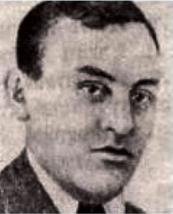Motl Gartsman was born in 1909 in Berdichev, in a Jewish family. He was one of many siblings. Inspired by the lyrics of Jewish songs, Motl began to write poetry at an early age. After finishing school, Gartsman moved to Odessa, where he completed his studies at a pedagogical technikum.
Motl's first poems were published when he was fifteen.
In 1929, Motl Gartsman enrolled in the Jewish section of the Literature Department of Moscow State University, where he studied for four years. At the time, this was still a legitimate field of study. Later, in 1938, this section would be abolished (along with many other Jewish educational programs), and the heads of the Literature Department would be accused of harboring "nationalist and Zionist sentiments."
In 1936, Motl completed his graduate studies at the Jewish Culture Institute in Kiev.
In the 1930s, the national cultures of the USSR were increasingly pressured to conform to the Stalinist model of culture, which was to be "national in its form, and socialist in its content." Writers were additionally required to adhere to the canons of socialist realism and extol the virtues of the new Soviet life. However, in the second half of the 1930s writers still had considerable latitude to explore the Jewish theme in a broader context, especially when it came to the classical Yiddish-language authors: Sholem Abramovich (Mendele Mocher Sforim), Sholem Aleichem, and Isaac Leib Peretz. Unsurprisingly, Gartsman dedicated a cycle of his poems to his favorite author, Sholem Aleichem.
Following the German invasion of the USSR in late June 1941, Motl Gartsman volunteered for frontline duty. In 1942, as an evacuee in Ufa (Bashkiria), he was called up for military service. After completing a course for paramedics in Ufa, he was given the rank of Junior Lieutenant of the Medical Service and dispatched to the front lines. There, he showed much courage: commanding a medical platoon, he saved the lives of many wounded soldiers. On December 3, 1943, Motl Gartsman was awarded the Order of the Red Star. He continued to write poetry during the war. His long poem "Der toyt-urteyl" ("The Death Sentence") was written while he was on active duty. Gartsman dreamed of relaunching his literary career by becoming a military correspondent. On December 15, 1943, Motl Gartsman was killed in action (or went missing in action, according to another version).
In 1948, Motl Gartsman's widow donated her husband's archive to Yehezkiel Dobrushin, a member of the Jewish Anti-Fascist Committee who was working on a series of articles on writers who had fought in the war.
That same year, Dobrushin was arrested and died in jail, and the entire archive vanished along with him. Gartsman published a total of 12 books, and some of his poems have been translated into Russian and Ukrainian.
A Letter from Motl Gartsman to David Bergelson, Yehezkiel Dobrushin, Aron Kushnirov, and Shmuel Halkin
Dear Comrades Bergelson, Dobrushin, Kushnirov, Halkin, and all the others. I sent three poems about Ukraine and the people to Eynikayt. Have you received them yet? Have they appeared in the newspaper? If they have, I would insistently ask you to send me the issue with the poems. I am currently working for the frontline troops, and all my thoughts go with you. My fondest wish is to compose an epic poem about the heroism of the Jewish people in the Patriotic War – but, alas, there is simply no way for me to write it. I have gathered extensive materials for this project. I serve as a field medic. If I were allowed to work for the Army like all of my fellow writers, I should be able to discharge my duty to literature and to my people. I ask you to help me to once again become a poet, so that I could give all my strength to the Soviet people, and to my own Jewish people. I have drawn up plans for poems (both lyric and epic ones) and for a heroic verse drama aimed at young adults. Here is a little background about myself: I have been nominated for the Order of the Red Star. Despite have been declared dead twice, I still live and breathe. I became a Communist while in the Army, and am now a Party member. This is my brief resume.
I am hoping for a prompt reply, my dear fellow writers. Send my request to the following address: Military Mail 72536 s., for literary work. I have been promised that my request will be granted, given the respect accorded to my work.
With heartfelt greetings to you all, my dear comrades.
Yours, Gartsman.1
- 1. GARF 8114-1-1056 p. 15







